
A sector at the centre of technological research and development: the commitment of Ecopneus
In recent years, great attention has been paid to the study and development of technical solutions aimed at improving road performances for what concerns their reliability, safety, and comfort for drivers. Asphalts modified with ELT-derived rubber powder represent one of the most interesting solutions for the Public Administration, Management Bodies and the operators of the road sector.
Ecopneus has activated and supported several studies and research projects aimed at spreading the necessary information and raising the awareness of this valid application of recycled rubber. Indeed, Ecopneus has been a partner in several new structures and a protagonist of many noise monitoring campaigns, studies on the exposition of workers and analyses of the associated risks. This body of research has been carried out in collaboration with main Italian and European research centres.
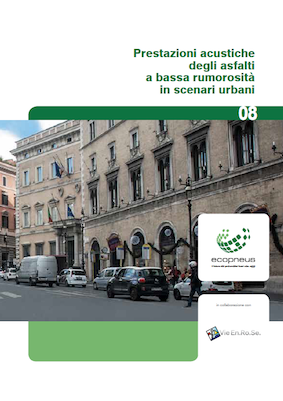
The technical handbooks on modified asphalts
In collaboration with universities and research centres, Ecopneus has promoted a series of handbooks where technical aspects, case histories, formulations, and performances of the various typologies of rubberised asphalt are scientifically presented. The objective is to favour the circulation of information and technical updates among all the subjects of the Italian asphalt chain. In its turn, this greater circulation of information aims at leading to a wider use of this valid application on our roads. Download them all!
08. Prestazioni acustiche degli asfalti modificati in scenari urbani
13. Guida per la produzione di bitumi con polverino di gomma da PFU
16. La Variante Canali di Reggio Emilia: una strada green
17: Strati di usura con polverino da PFU per la viabilità urbana
The collaboration with the Army: tests and new formulations
Ecopneus and several divisions of the Army have shared their own technical know-how and scientific skills to jointly study the ideal performances and formulations of the several applications of recycled rubber in greater depth. The first interventions have already been completed at the Military Citadel of the Cecchignola in Rome and at the Military Hospital Centre of Milan.
The experimentation on the ANAS road network
The results of an experimentation started in July 2019 on the ANAS road network, have confirmed the validity of this technology for the noise requalification of road surfaces. The tests have shown that the use of environmentally compatible technologies and materials represents the technical solution that better complies with the objectives of environmental and noise impact reduction. At the same time, they assure excellent running performances.
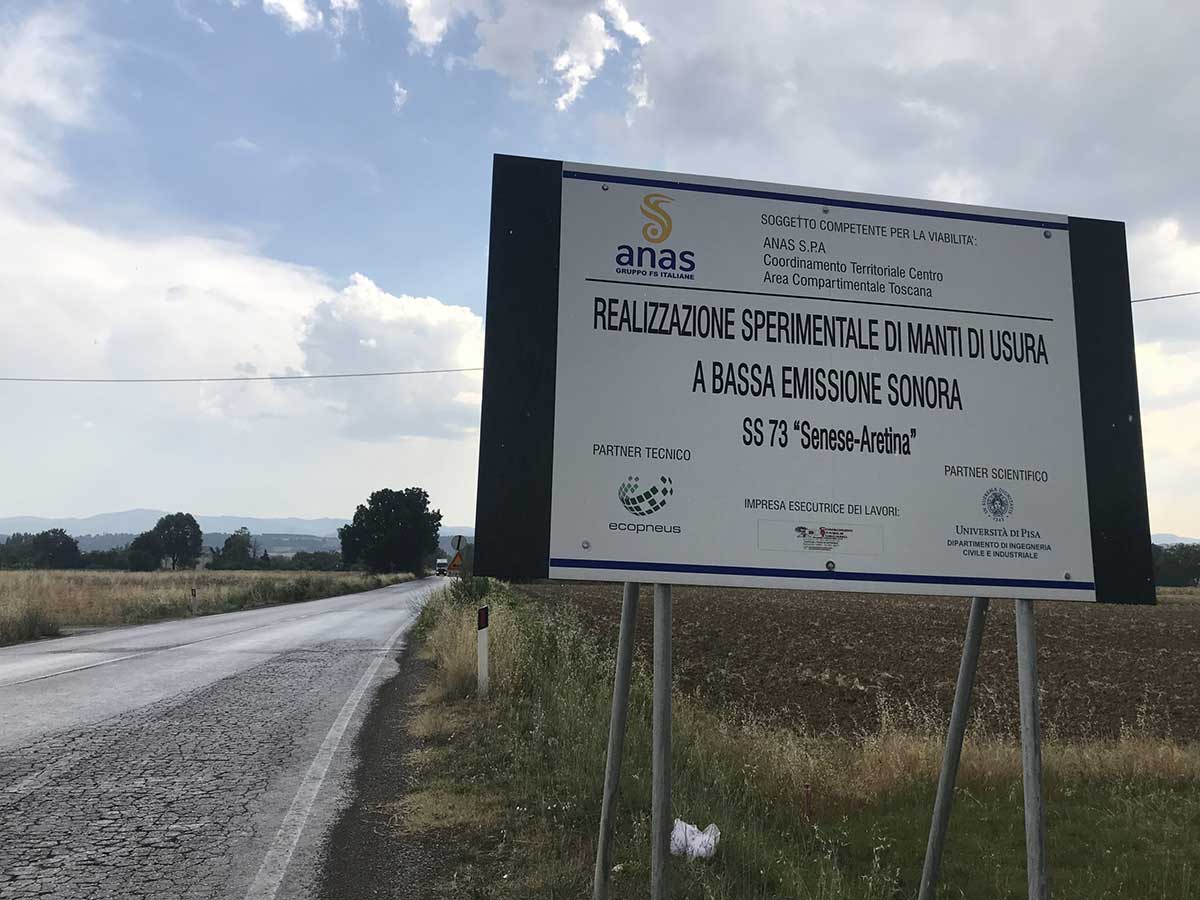
The Eu Nereide Project
The Life-Nereide project is co-financed by the European Union. It aims at optimising the benefits of acoustic and air pollution reduction and of the overall environmental impact with the use of road surfaces made with recycled rubber and asphalt millings. Ecopneus is a partner of the project together with the University of Pisa (that is also the co-ordinator), ARPA Tuscany (The Environmental Protection Regional Agency), the Belgian Road Research Centre, the CNR’s “Orso Mario Corbino” Institute of acoustics and sensoristics, and Region Tuscany.
12 different mixes of bituminous conglomerates have already been developed in the course of the project. They are specifically designed for wear layers with low noise emissions and they have been used to surface certain areas of Tuscany, in the Provinces of Lucca and Arezzo.
24,000 kg of recycled rubber and 30-50% of recycled asphalts have been used overall. The surfaces have been made and laid with a “warm” technology – that is, at temperatures that are 30-40°C lower than the ones of traditional asphalts. This has allowed to achieve a 30% reduction in the emissions of Aromatic Polycyclic Hydrocarbon (PAHs) fumes.
An urban noise reduction of about 5dB and a 20% friction increase are expected, improving also road safety.
The RubbeRap international Research Project
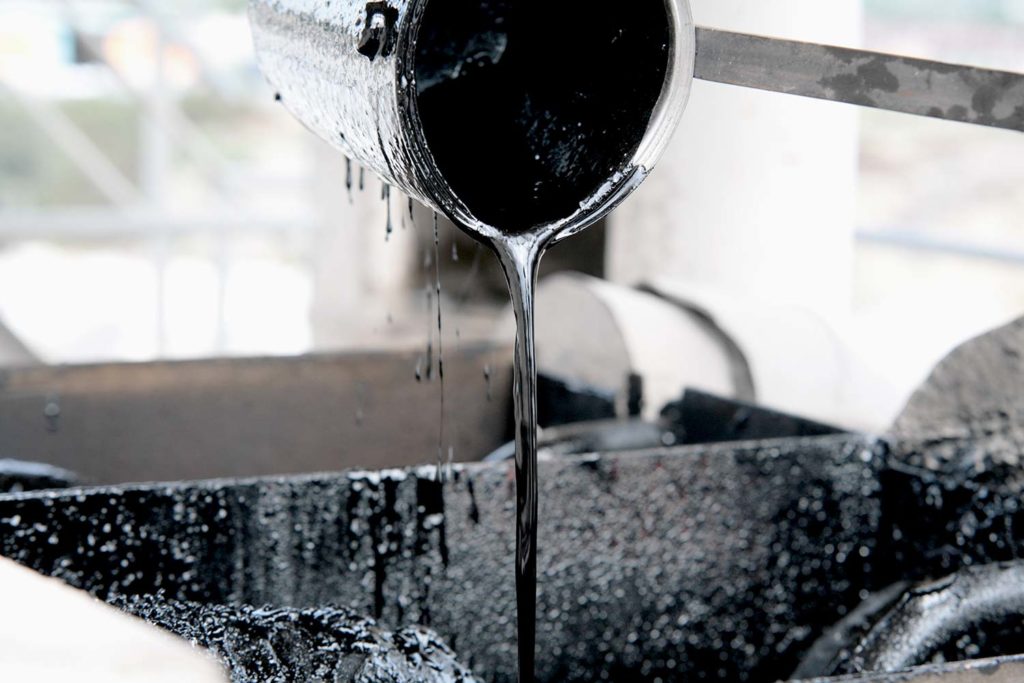 Ecopneus, the University of the Studies of Palermo and the French University Gustave Eiffel are partners of the RubberRap international project, The objective of this project is to supply scientific data with reference to the possibility of effectively using asphalt millings at laboratory scale and beyond. The project has been launched recently. It provides for the implementation of a multidisciplinary experimental programme aimed at engineering regenerated rubberised asphalt, determining the mechanical performances and the quality of the fumes produced during the mixing. The laboratory campaign shall be carried out by comparing conventional mixes with Rub-RAP ones produced with at least two ageing cycles.
Ecopneus, the University of the Studies of Palermo and the French University Gustave Eiffel are partners of the RubberRap international project, The objective of this project is to supply scientific data with reference to the possibility of effectively using asphalt millings at laboratory scale and beyond. The project has been launched recently. It provides for the implementation of a multidisciplinary experimental programme aimed at engineering regenerated rubberised asphalt, determining the mechanical performances and the quality of the fumes produced during the mixing. The laboratory campaign shall be carried out by comparing conventional mixes with Rub-RAP ones produced with at least two ageing cycles.
The first on-field test of the research has recently been carried out in the Province of Trapani. During this test, experimental surfaces have been laid to verify the absence of operative limitations during the mixing, laying and compacting phases. Workers, entrepreneurs and technical figures of some councils of the Province of Trapani have been able to ascertain how the workability, the fume emissions, and the cleanliness of the equipment are actually better than conventional asphalts.
Technical articles:

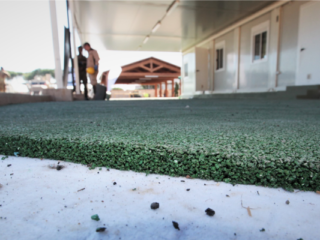
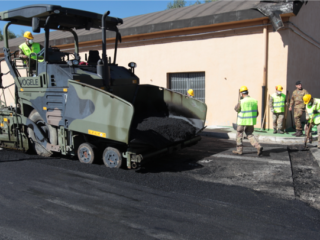
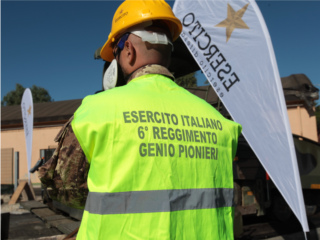
 Collect ELT
Collect ELT